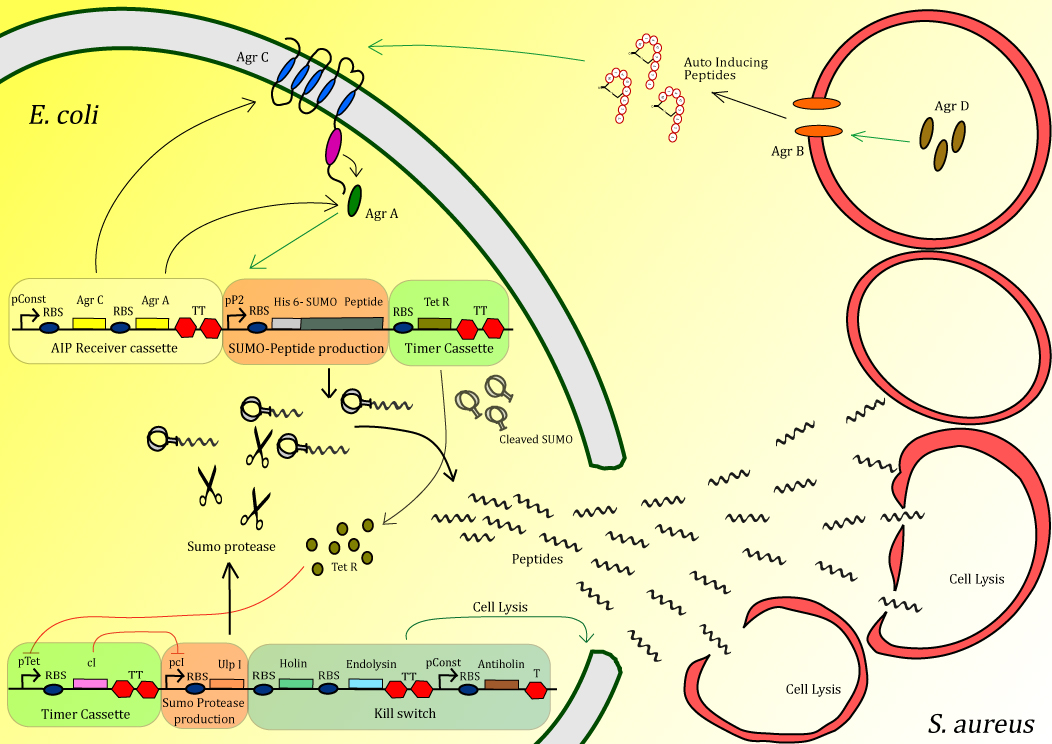Team:TU-Delft
From 2013.igem.org
(Difference between revisions)
Jfkooijman (Talk | contribs) |
|||
| (75 intermediate revisions not shown) | |||
| Line 3: | Line 3: | ||
{{:Team:TU-Delft/Templates/Frog}} | {{:Team:TU-Delft/Templates/Frog}} | ||
{{:Team:TU-Delft/Templates/Logo}} | {{:Team:TU-Delft/Templates/Logo}} | ||
| - | |||
| - | |||
<html> | <html> | ||
| - | + | <div style="margin-top:-20px;margin-bottom:5px;"> | |
| - | + | <center> | |
| - | <div style="margin- | + | <a href="https://static.igem.org/mediawiki/2013/8/82/Pep9.jpg"> |
| - | + | <img src="https://static.igem.org/mediawiki/2013/8/82/Pep9.jpg" alt="" HEIGHT=90" WIDTH="700" /> | |
| - | + | </a> | |
| + | </center> | ||
</div> | </div> | ||
| Line 73: | Line 72: | ||
</li> | </li> | ||
| + | |||
| + | <li> <h2>Aim</h2><div style="margin-left:10px;margin-right:10px;float:left;display:inline-block;"><p align="justify"> To engineer <i>Escherichia coli</i> that can detect MRSA in order to locally produce and deliver antimicrobial peptides. The project is divided into several essential modules. | ||
| + | </p> | ||
| + | |||
| + | |||
| + | </li> | ||
| + | |||
<li> | <li> | ||
<h2>Sensing autoinducing peptides</h2> | <h2>Sensing autoinducing peptides</h2> | ||
| Line 81: | Line 87: | ||
<li> | <li> | ||
<h2>Peptide Production</h2> | <h2>Peptide Production</h2> | ||
| - | <div style="margin-left:10px;margin-right:10px;float:left;display:inline-block;"><p align="justify"> <i>E.coli</i> detects <i>Staphylococcus aureus</i> by its own quorum sensing system, and at that moment inactivated antimicrobial peptides are being produced </p> | + | <div style="margin-left:10px;margin-right:10px;float:left;display:inline-block;"><p align="justify"> <i>E. coli</i> detects <i>Staphylococcus aureus</i> by its own quorum sensing system, and at that moment inactivated antimicrobial peptides are being produced </p> |
</li> | </li> | ||
<li> | <li> | ||
| Line 113: | Line 119: | ||
</a> | </a> | ||
</li> | </li> | ||
| + | |||
| + | <li> | ||
| + | <a href="https://2013.igem.org/Team:TU-Delft/ProjectOverview"> | ||
| + | <img src="https://static.igem.org/mediawiki/2013/5/51/Schem-new.jpg" alt="" HEIGHT="348" WIDTH="600"/> | ||
| + | </a> | ||
| + | |||
| + | </li> | ||
| + | |||
| + | |||
<li> | <li> | ||
<a href="https://2013.igem.org/Team:TU-Delft/Sensing"> | <a href="https://2013.igem.org/Team:TU-Delft/Sensing"> | ||
| Line 132: | Line 147: | ||
<a href="https://2013.igem.org/Team:TU-Delft/Killswitch"> | <a href="https://2013.igem.org/Team:TU-Delft/Killswitch"> | ||
<img src="https://static.igem.org/mediawiki/2013/f/f8/Kill2.jpg" alt="" HEIGHT="348" WIDTH="600"/> | <img src="https://static.igem.org/mediawiki/2013/f/f8/Kill2.jpg" alt="" HEIGHT="348" WIDTH="600"/> | ||
| + | </a></li> | ||
| + | |||
| + | <li> | ||
| + | <a href="https://2013.igem.org/Team:TU-Delft/Zephyr"> | ||
| + | <img src="https://static.igem.org/mediawiki/2013/4/4c/2D_table_ZephyrHome.jpg" alt="" WIDTH="600"/> | ||
</a> | </a> | ||
| + | |||
</li> | </li> | ||
| Line 140: | Line 161: | ||
<div class="slider-nav"> | <div class="slider-nav"> | ||
<a href="https://2013.igem.org/Team:TU-Delft/Team">1</a> | <a href="https://2013.igem.org/Team:TU-Delft/Team">1</a> | ||
| - | <a href="https://2013.igem.org/Team:TU-Delft/Sensing"> | + | <a href="https://2013.igem.org/Team:TU-Delft/ProjectOverview">2</a> |
| - | <a href="https://2013.igem.org/Team:TU-Delft/Peptides"> | + | <a href="https://2013.igem.org/Team:TU-Delft/Sensing">3</a> |
| - | <a href="https://2013.igem.org/Team:TU-Delft/Timer"> | + | <a href="https://2013.igem.org/Team:TU-Delft/Peptides">4</a> |
| - | <a href="https://2013.igem.org/Team:TU-Delft/Killswitch"> | + | <a href="https://2013.igem.org/Team:TU-Delft/Timer">5</a> |
| - | <a href="https://2013.igem.org/Team:TU-Delft/Zephyr"> | + | <a href="https://2013.igem.org/Team:TU-Delft/Killswitch">6</a> |
| + | <a href="https://2013.igem.org/Team:TU-Delft/Zephyr">7</a> | ||
<div class="cl"> </div> | <div class="cl"> </div> | ||
| Line 154: | Line 176: | ||
<!-- Main --> | <!-- Main --> | ||
<br> | <br> | ||
| - | + | ||
<div style="margin-left:40px;width:420px;float:left;display:inline-block;"> | <div style="margin-left:40px;width:420px;float:left;display:inline-block;"> | ||
| + | <br> | ||
| + | |||
<script>(function(d, s, id) { | <script>(function(d, s, id) { | ||
| Line 180: | Line 204: | ||
<br> | <br> | ||
<br> | <br> | ||
| - | < | + | |
| - | < | + | <center> |
| - | < | + | <p> <h3> Check out what news in Netherlands has to say about the achievements of our Team </p><a href="https://2013.igem.org/Team:TU-Delft/PR" target="blank"> In News. </a> </h3> <br> </center> |
| - | <br> | + | |
<div style="margin-top:10px;margin-left:400px;float:left;display:inline-block;"> | <div style="margin-top:10px;margin-left:400px;float:left;display:inline-block;"> | ||
| Line 233: | Line 256: | ||
<td style="text-align: center;"> | <td style="text-align: center;"> | ||
</td> | </td> | ||
| + | </tr> | ||
| + | |||
| + | <tr> | ||
| + | <td style="text-align: center;" width="250px"> | ||
| + | <a href="https://static.igem.org/mediawiki/2013/archive/5/58/20131028223200!Logo_ERASynBio.png"target="_blank"><img src=" https://static.igem.org/mediawiki/2013/archive/5/58/20131028223200!Logo_ERASynBio.png"width=120 height=40> </a> | ||
| + | </td> | ||
</tr> | </tr> | ||
</table> | </table> | ||
Latest revision as of 22:37, 28 October 2013

 "
"















